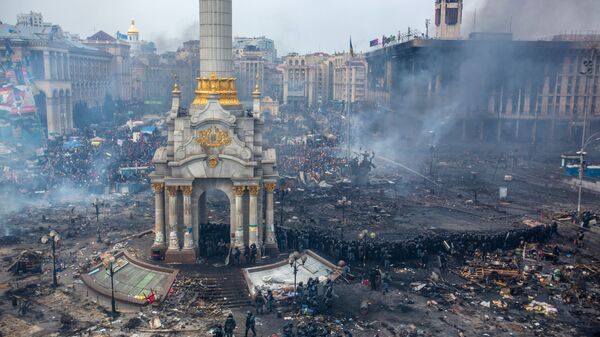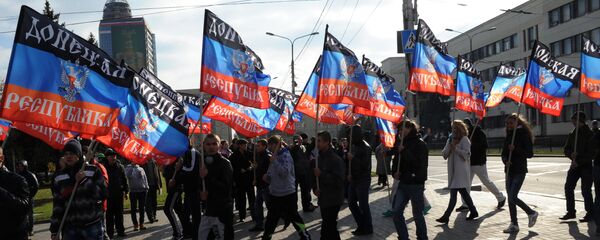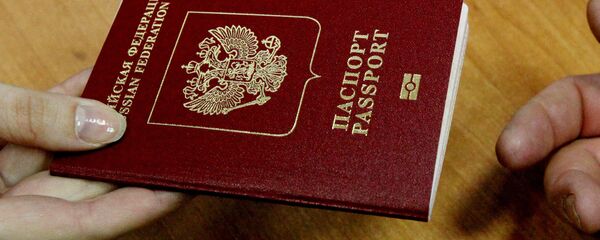Self-proclaimed Donetsk People's Republic (DPR) Leader Alexander Zakharchenko proposed on Tuesday a three-year transition period toward a new state called Malorossiya ("Little Russia") as a way to settle the three-year conflict in Ukraine.
He called on the international community to support his proposal. However, for a long time now the EU has kept silent about the Donbass war.
Sputnik spoke with Maurizio Marrone, a member of the regional council and the city administration of Turin in an interview, about this issue.
According to him, “the EU understands that it has taken the wrong side in the conflict, that it has a great responsibility and therefore there are constant attempts to censor the reports about this war as much as possible.”
Marrone further said that such censorship is due to the fact that the European Union and the governments of the member countries are involved in this war.
“The ceasefire is never observed. I personally visited Donetsk and Lugansk three times, where I saw with my own eyes how the artillery of Kiev bombed the quarters in which the civilian population lives, which constantly leads to new victims,” he said.
Talking about a recent conference which took place in the Italian parliament about the war in Donbass, Marrone said that the conference is an important event, since for the first time the topic of war in Donbass was discussed in the Italian Parliament.
“We wanted to draw the attention of Italian politics to the conflict, which until now has not been discussed. This is a war that indirectly affects the countries of Europe as we are talking about economic sanctions,” he further told Sputnik.
He further said that the Italian government knows what damage the anti-Russian sanctions have inflicted on exports and on Italian entrepreneurs. But despite that the Italian government is not standing up to the EU.
“Italy is forced to send its military to Latvia within the framework of the NATO mission and at the political level, Rome does not have the courage to refuse the contributions that it is forced to pay to the alliance,” he added.
The conference "Donbass: The War on Conscience of Europe" was held for the first time in the Chamber of Deputies of the Italian Parliament.
Recently, the Office of the United Nations High Commissioner for Human Rights submitted a report in which Ukraine was presented with over 16 claims for such grave crimes as torture, unlawful deprivation of liberty and violation of freedom of movement.
“We are afraid that [Ukraine] can be used [by the European Union and the United States] as a springboard for the siege of the so-called ‘Russian World’. We hope that sooner or later the Italian government will come out of this conflict and reconsider its attitude towards NATO,” Marrone said.
The politician also spoke about a project that he is currently involved in. It is called “101 life” and its purpose is to inform the public about the number of children that have been killed in the conflict, which has already exceeded 100.
He expressed hope that Italy will move towards an alliance with Russia and that the two countries will become trade and economic partners once again.
Marrone also stressed the importance of working together as geopolitical partners in the fight against terrorism.
“We, as part of the Western world, see that Moscow is fighting against Daesh almost alone. We must realize that our enemy is Islamic terrorism, not Russia,” Marrone concluded.
Malorossiya has been declared as a sovereign federated state with the capital of Donetsk and successor state to Ukraine. The new state's constitution will be approved after a referendum and broad discussion.
The new country will seek to join the union state of Russia and Belarus while keeping its sovereignty.
The Donbass conflict erupted in April 2014 as a local counter-reaction to the West-sponsored Maidan coup in Kiev that had toppled President Viktor Yanukovych in February.
Residents of the Donetsk and Lugansk regions held independence referendums and proclaimed the People's Republics of Donetsk and Lugansk. Kiev has since been conducting a military operation, encountering stiff local resistance.
In February 2015, Kiev forces and Donbass independence supporters signed a peace agreement in the Belarusian capital of Minsk.
The deal stipulates a full ceasefire, weapons withdrawal from the line of contact in Donbass, as well as constitutional reforms that would give a special status to the Donetsk and Lugansk People's Republics.
Despite the agreement brokered by the Normandy Four states (Russia, France, Germany and Ukraine), the ceasefire regime is regularly violated, with both sides accusing each other of multiple breaches, undermining the terms of the accord.





